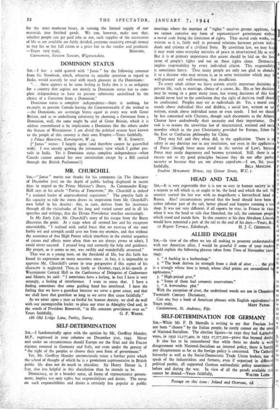SELF-DETERMINATION
SIR,—I fundamentally agree with the opinion by Mr. Geoffrey Mander, M.P., expressed in your columns on December 31st, 1943. Never and under no circumstances should Europe see the Nazi and the Fascist regimes restored in Germany and Italy, not even under the pretext of " the right of the peoples to choose their own form of government_" Yet, Mr. Geoffrey Mander unconsciously raises a further point which the school of thought of which he is a prominent representative in British public life does not do much to elucidate. Sir Henry Slesser is, I far, also less helpful in this elucidation than he intends to be. Democracy, or in a broader sense, all forms of representative govern- ment, implies not only rights but responsibilities and duties. The stress en such responsibilities and duties is certainly less popular at public meetings where the mention of "rights" receives greater applause, b we cannot conceive any form of representative government witho a moral code fixing the limitation of rights. That moral code works, u written as it is, fairly well in personal relations between private indiv duals and citizens of a civilised State. By unwritten law, we may ho it may work some everyday miracles of peace in international life as well But it is of primary importance that accent should be laid on the lini taton of people's rights and not on these rights alone. Democra. implies responsibility by every individual citizen. This responsibili is sometimes heavy. Thus many people are only too glad to aband it to a dictator who may misuse it, or to some institution which may well-planned and well-meaning, but insufficient.
To every adult citizen we leave certain utterly important decisions private life, such as marriage, choice of a career, &c. His or her decisio may be wrong in a great many cases, but wrong decisions of this ki should never lead to the conclusion that the right of decision itself shout be confiscated. Peoples may err as individuals do. Yet, a moral stands above individual likes and dislikes, a social law, written or un written, stands above individual tastes or even needs. I feel we shou be less concerned with Charters, though such documents as the Atlan Charter have undoubtedly their necessity and their importance. 0 task is to restore the unwritten law of international, national and soci morality which in the past Christianity provided for Europe, Islam f the East or Confucian philosophy for China.
They may fail, and they often did, in the application. There is n safety in any doctrine nor in any institution, nor even in the applicatio of Force (though force must stand in the service of Law), becau IT Force may easily degenerate and become tyrannical. Still, there is n a; excuse not to try good principles because they do not offer perf security or because they are not always expedient. —I am, Sir, you






















 Previous page
Previous page